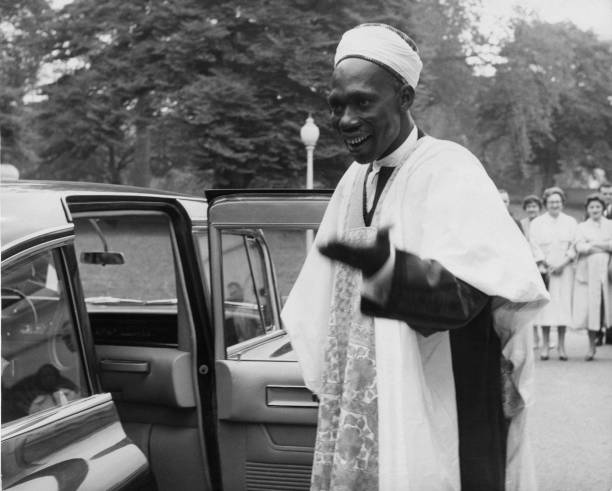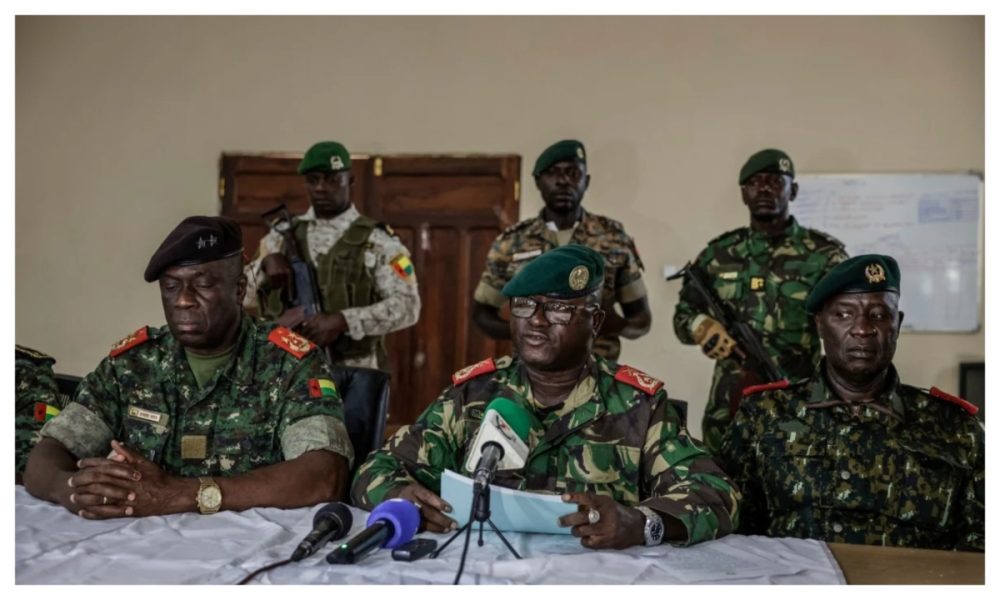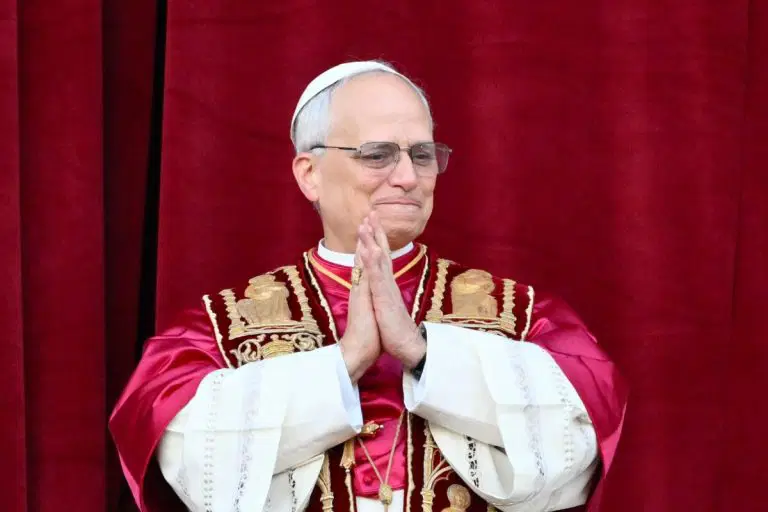Headline
Nigeria’s First Prime Minister, Abubakar Tafawa Balewa’s 1960 Independence Day Speech [Memories]

Today is Independence Day. The first of October 1960 is a date to which for two years every Nigerian has been eagerly looking forward. At last, our great day has arrived, and Nigeria is now indeed an independent sovereign nation.
Words cannot adequately express my joy and pride at being the Nigerian citizen privileged to accept from Her Royal Highness these Constitutional Instruments which are the symbols of Nigeria’s Independence. It is a unique privilege which I shall remember forever, and it gives me strength and courage as I dedicate my life to the service of our country.
This is a wonderful day, and it is all the more wonderful because we have awaited it with increasing impatience, compelled to watch one country after another overtaking us on the road when we had so nearly reached our goal. But now we have acquired our rightful status, and I feel sure that history will show that the building of our nation proceeded at the wisest pace: it has been thorough, and Nigeria now stands well-built upon firm foundations.
Today’s ceremony marks the culmination of a process, which began 15 years ago and has now reached a happy and successful conclusion. It is with justifiable pride that we claim the achievement of our Independence to be unparallelled in the annals of history. Each step of our constitutional advance has been purposefully and peacefully planned with full and open consultation, not only between representatives of all the various interests in Nigeria but in harmonious cooperation with the administering power which has today relinquished its authority.
At the time when our constitutional development entered upon its final phase, the emphasis was largely upon self-government. We, the elected representatives of the people of Nigeria, concentrated on proving that we were fully capable of managing our own affairs both internally and as a nation. However, we were not to be allowed the selfish luxury of focusing our interest in our own homes. In these days of rapid communications, we cannot live in isolation, apart from the rest of the world, even if we wished to do so. All too soon it has become evident that for us Independence implies a great deal more than self-government. This great country, which has now emerged without bitterness or bloodshed, finds that she must at once be ready to deal with grave international issues.
This fact has of recent months been unhappily emphasised by the startling events which have occurred in this continent. I shall not labour the point but it would be unrealistic not to draw attention first to the awe-inspiring task confronting us at the very start of our nationhood. When this day in October 1960 was chosen for our Independence it seemed that we were destined to move with quiet dignity to place on the world stage. Recent events have changed the scene beyond recognition, so that we find ourselves today being tested to the utmost we are called upon immediately to show that our claims to the responsible government are well-founded, and having been accepted as an independent state we must at once play an active part in maintaining the peace of the world and in preserving civilisation. I promise you, we shall not fail for want of determination.
And we come to this task better-equipped than many. For this, I pay tribute to the manner in which successive British governments have gradually transferred the burden of responsibility to our shoulders. The assistance and unfailing encouragement which we have received from each Secretary of State for the Colonies and their intense personal interest in our development has immeasurably lightened that burden.
All our friends in the Colonial Office must today be proud of their handiwork and in the knowledge that they have helped to lay the foundations of a lasting friendship between our two nations. I have indeed every confidence that, based on the happy experience of a successful partnership, our future relations with the United Kingdom will be more cordial than ever, bound together, as we shall be in the Commonwealth, by a common allegiance to Her Majesty Queen Elizabeth, whom today we proudly acclaim as Queen of Nigeria and Head of the Commonwealth.
Time will not permit the individual mention of all those friends, many of them Nigerians, whose selfless labours have contributed to our Independence. Some have not lived to see the fulfilment of their hopes on them be peace, “but nevertheless they are remembered here, and the names of buildings and streets and roads and bridges throughout the country recall to our minds their achievements, some of them on a national scale. Others confined, perhaps, to a small area in one Division, are more humble but of equal value in the sum-total.
Today, we have with us representatives of those who have made Nigeria: Representatives of the Regional Governments, of former Central Governments, of the Missionary Societies, and of the Banking and Commercial enterprises, and members, both past and present, of the Public Service. We welcome you, and we rejoice that you have been able to come and share in our celebrations. We wish that it could have been possible for all of those whom you represent to be here today: Many, I know, will be disappointed to be absent, but if they are listening to me now, I say to them, “Thank you on behalf of my Thank you for your devoted service, which helped build Nigeria into a nation. Today we are reaping the harvest which you sowed, and the quality of the harvest is equalled only by our gratitude to you. May God bless you all.
This is an occasion when our hearts are filled with conflicting emotions: we are, indeed, proud to have achieved our independence, and proud that our efforts should have contributed to this happy event. But do not mistake our pride for arrogance. It is tempered by feelings of sincere gratitude to all who have shared in the task of developing Nigeria politically, socially and economically. We are grateful to the British officers whom we have known, first as masters, and then as leaders, and finally as partners, but always as friends. And there have been countless missionaries who have laboured unceasingly in the cause of education and to whom we owe many of our medical services. We are grateful also to those who have brought modern methods of banking and of commerce, and new industries. I wish to pay tribute to all of these people and to declare our everlasting admiration of their devotion to duty.
And, finally, I must express our gratitude to Her Royal Highness the Princess Alexandra of Kent for personally bringing to us these symbols of our freedom, and especially for delivering the gracious message from Her Majesty The Queen. And so, with the words “God save our Queen”, I open a new chapter in the history of Nigeria, and of the Commonwealth, and indeed of the world.
Balewa, Nigeria’s first prime minister, delivered this speech on October 1, 1960
Headline
Coup: Guinea-Bissau Junta Releases Six Held Opposition Politicians

Guinea-Bissau’s ruling junta on Tuesday released six members of the political opposition who had been detained since a coup last month.
The six freed opposition members are said to be close associates of Domingos Simoes Pereira, head of the PAIGC party that led the country to independence in 1974.
Pereira has been in custody since the coup.
In a statement by the High Military Command, the junta’s governing body, the releases are described as a sign of good faith and a step towards the return to constitutional normality and respect for international rights.
READ ALSO:Why West African Troops Overturned Benin’s Coup But Watched Others Pass
The army seized power on 26 November after ousting outgoing President Umaro Sissoco Embalo in the wake of a presidential vote.
After taking over, the military suspended the electoral process and announced it would take control of the West African country for a period of one year.
Recall that another opposition candidate, Fernando Dias, took refuge in Nigeria’s embassy, which granted him asylum, while Embalo fled the country after being briefly detained by the military at the time of the coup.
Meanwhile, Senegal’s Foreign Minister, Cheikh Niang, led a delegation to Guinea-Bissau, where he met with detained opponents and requested their release.
Headline
7 Territories Still Under Colonial Rule

Even though most nations became independent in the last century, some territories are still ruled by other nations.
Contents
1. Western Sahara
2. Guam
3. American Samoa
4. United States Virgin Islands
5. Falkland Islands / Malvinas
6. Gibraltar
7. Bermuda
Many of them remain on the United Nations list of non-self-governing territories, meaning they have not completed the process of decolonization. These places usually depend on bigger countries for laws, passports, defence, or political control.
In this article, Nigerian Tribune highlights 7 territories still under colonial rule:
READ ALSO:Nigeria Ranks World’s 102nd Happiest Nation, US, Germany Not Among 20 Top Counties
1. Western Sahara
Western Sahara remains one of the world’s biggest unresolved colonial issues. Morocco controls most of the territory, but the Polisario Front wants independence for the Sahrawi people. The UN is still trying to help both sides agree on a peaceful solution.
2. Guam
Guam is an important US territory in the Pacific, used heavily for American military operations. The US oversees its defence and foreign relations.
People living there are US citizens, but they cannot vote in presidential elections and do not have full representation in Congress.
READ ALSO:FULL LIST: US To Review Green Cards From 19 ‘Countries Of Concern’ After Washington Shooting
3. American Samoa
American Samoa has more local control than Guam, but the United States still decides immigration, defence, and foreign affairs.
Residents are considered US nationals and must apply if they want full citizenship.
4. United States Virgin Islands
The US Virgin Islands have their own legislature, but the United States makes major constitutional and political decisions. The territory depends heavily on US federal support.
5. Falkland Islands / Malvinas
The Falkland Islands remain controlled by the United Kingdom (UK), but Argentina has long disputed this claim, having been in control of the Islands for a few years before 1833.
The people living there voted strongly to stay British, yet the sovereignty dispute continues to appear in the UN.
READ ALSO:Six Countries With Highest Number Of Billionaires In 2025
6. Gibraltar
Gibraltar sits at the Southern tip of Spain. The United Kingdom controls it, but Spain insists the territory belongs to them.
Gibraltarians have repeatedly voted in favour of remaining British, but the dispute is still discussed within the UN Decolonisation Committee.
7. Bermuda
Bermuda is a British Overseas Territory situated in the North Atlantic Ocean. Although it manages most of its own internal affairs and enjoys a strong economy with modern facilities, the United Kingdom still handles its defence and represents it in global matters.
Headline
Russia-Ukraine War: Pope Leo Calls For Global Christmas Truce

Pope Leo XIV on Tuesday renewed his call for a global truce on Christmas Day, saying he felt “great sadness” after Russia “apparently rejected a request” for a pause in fighting.
Speaking to reporters at his residence in Castel Gandolfo near Rome, the Pope urged all sides involved in conflict to observe at least one day of peace.
“I am renewing my request to all people of goodwill to respect a day of peace — at least on the feast of the birth of our Saviour,” Leo said.
Recall that Russia invaded Ukraine in February 2022 and has repeatedly turned down calls for a ceasefire, arguing that any pause would give Ukraine a military advantage.
READ ALSO:Russian Strikes Kill Five In Ukraine, Cause Power Outages
“Among the things that cause me great sadness is the fact that Russia has apparently rejected a request for a truce,” the pope said.
Referring to conflicts worldwide, Leo added, “I hope they will listen and there will be 24 hours of peace in the whole world.”
The appeal came as fighting continued in eastern Ukraine. On Tuesday, Ukrainian forces withdrew from a town after heavy battles with Russian troops. Russian strikes killed three civilians and left thousands without power during winter temperatures.
READ ALSO:Trump Blasts Ukraine For ‘Zero Gratitude’ Amid Talks To Halt War
There was no indication of progress toward ending the war after separate meetings last weekend in Miami between the United States officials and negotiators from Russia and Ukraine. The conflict is nearing four years with no settlement in sight.
Earlier this month, Pope Leo met Ukrainian President Volodymyr Zelensky. When asked whether he would accept Zelensky’s invitation to visit Ukraine, the pope said, “I hope so,” while noting that it was not possible to say when such a visit could happen.
Leo also warned that efforts to secure peace without European diplomatic involvement were “unrealistic”, expressing optimism that President Donald Trump’s proposed peace plan could bring a “huge change” to the transatlantic alliance.

 News2 days ago
News2 days agoPHOTOS: New Era In Furupagha-Ebijaw As Okpururu 1 Receives Staff Of Office

 Metro5 days ago
Metro5 days agoJUST IN: Former Edo Information Commissioner Is Dead

 News2 days ago
News2 days agoUBTH CMD Marks 120 Days In Office, Expresses Commitment To Providing Conducive Working Environment

 Metro5 days ago
Metro5 days agoShe Grabs, Pulls My Manhood Anytime We Fight — Husband

 News2 days ago
News2 days agoFG Declares Public Holidays For Christmas, New Year Celebrations

 News5 days ago
News5 days agoCoordinator, Edo First Lady Office, Majority Leader, Rights Lawyer, Others Bag 2025 Leadership Award

 News2 days ago
News2 days agoOPINION: Gumi And His Terrorists

 News5 days ago
News5 days ago[OPINION] Tinubu: Ade Ori Okin Befits KWAM 1, Not Awujale Crown

 News2 days ago
News2 days agoFIRS Confirms NIN As Tax ID

 News5 days ago
News5 days agoMy Wife Dented My Image, Took Our Marital Crises To Radio Stations — Husband




















